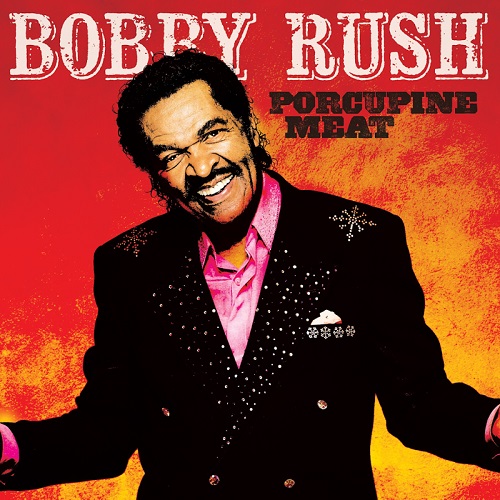
By Derek Malone
Bobby Rush is preternaturally nimble for an octogenarian, and still a sartorial peacock in his colorful, rhinestone-embroidered suit jackets and tight slacks. With a slick, black, jerry-curled hairdo, his mustachioed face seems perpetually graced with a broad smile. Like jazz great, Roy Haynes, he seems to have discovered a Fountain of Youth of his own in a life of ceaseless music-making and performing. A kind of James Brown of the blues, he has over 350 original songs to his credit, though he is still a relative unknown outside of the contemporary blues scene. On September 16th, 2016, his new album, Porcupine Meat, was released. It’s his first on the Rounder Records label, and possibly one of his best.
Nominated for a Grammy this year for Best Traditional Blues Album, it is a retro-soul effort with plenty of funk overtones. The whole twelve-track LP has a gritty, but decidedly laid-back, early 70’s sound, replete with generous helpings of soothing electric piano, clean-toned and crisp guitar licks, pop tight-snared funky drumming that pops, and a Stax-style horns section–all tastefully executed by a cadre of seasoned Louisiana-based session players under veteran producer Scott Billington. Rush himself has a booming voice, and a vivid, succinct storytelling style that he punctuates with frequent blasts of soulful vibrato on the harmonica. Listening to it, it was easy to imagine myself sitting in the back of a smoke-filled club, slowly bobbing my head, a few drinks in, at peak buzz.
Like many, I first became aware of Mr. Rush in the Martin Scorsese-produced documentary series: The Blues: A Musical Journey, which aired on PBS in 2003, though Rush has had a musical career going back over half a century. For me, he was the standout figure. I remember the clips of him on the road, traversing the country in his tour bus, singing to spirited and boozy crowds at a procession of black clubs in the South. At one point in the film, there’s a great scene where he brings the house down while decked-out in ostentatious finery, full band playing, alongside an unforgettable twerking showgirl–a good enough primer as any for the proper appreciation of his rollicking body of work.
A walking funk rhythm, reminiscent of Steve Wonder’s “Superstition,” kicks things off on the opening track as the band comes in full-bore with, “I Don’t Want Nobody Hanging Around,” a humorous and candid tale of sexual jealousy. (A thematic companion piece, “I Think Your Dress Is Too Short,” later provides a more ribald take on the same dilemma.)
The title track, “Porcupine Meat” (“too fat to eat, too lean to throw away’) features some lush wah-wah playing by frequent collaborator Vasti Jackson on the guitar and is undergirded by a smooth, but tricky shuffle groove. Therein Rush laments being in love with a woman who is bad for his soul, and yet all the more irresistible just the same. I know the feeling.
Drummer Jeffrey “Jellybean” Anderson gets his day in the sun, laying down a fat backbeat on the snare amidst a complex ostinato of ghost-notes in “Funk O’ De Funk,” a song which is a kind of marriage between James Brown and Parliament, by way of New Orleans Blues.
On some of the tracks there’s a nice doubling-up of Cornell Williams’ bass lines with Jeff Albert’s trombone. The effect is subtle, but a makes a fat rhythm waddle with heft. This is especially apparent on “Got Me Accused”, a prison-blues, laden with melancholy volume swells on the guitar. At seven minutes, it is also the closest Rush comes to an epic here.
Guitar aficionados will be no doubt be pleased by the guest appearances by Dave Alvin, Keb’Mo’, and Joe Bonamassa, each of which bring their own distinctive playing styles to the proceedings–the latter in an entirely different hue with some extensive, distorted blues-rock soloing on the ballad “Me, Myself, and I.”
Things come to a world-weary end with a zydeco flavor in “I’m Tired,” whereby Rush alludes to his “rockin’ chair.” I don’t think he’s quite there yet, though it did occur to me while listening to this record that the blues are that rare American genre, like the western, where youth and good looks are not necessarily an advantage. A milieu where the most iconic and memorable roles go to the old, those weathered by long and hard experience. Bobby Rush, in all his flamboyant glory, is just such a character.
Porcupine Meat is available on:
Amazon: http://amzn.to/2kRDYyQ
iTunes: goo.gl/POUzpB

Leave A Comment